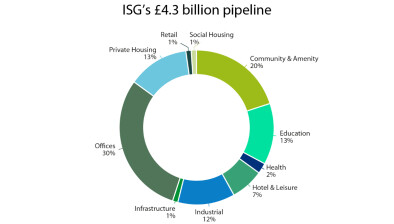ISG survey finds family time more valued by Scottish workforce
Nearly three quarters (72%) of the Scottish workforce sees more time with family, more time for themselves and a better overall work life balance as the overwhelming primary benefits of being given the work flex balance asked for from employers, according to a new study by office fit-out and construction specialist ISG.

In findings from a new UK-wide study examining the future of the workplace, work life balance was voted by more Scottish respondents than any other region. With nearly three quarters stating it would be the primary benefit if employers offered them the work flex balanced asked. This marked a 15% difference to the second highest, saving money on travel expenses (58%).
The unique survey captured workplace sentiment at the end of last year, before the COVID-19 pandemic hit the UK and then again in September this year after many had worked exclusively from home long term. During this period, it was found that professional pride dipped 10% for full time remote workers. Furthermore, those who opted to work from home full time, five days a week, also admitted they were 5% less likely to meet their objectives when compared to those who want to return to the office.
Of the 2,000 respondents surveyed, employees believed that spending on average three days a week in the office would be optimal for their productivity, compared to the lower average of two and a half days (2.53) a week anticipated by employers. When asked how many days they thought would be needed to optimise their wellbeing, workers cited on average over half a day less, 2.34 days per week, in the office.
It was also revealed the younger workforce was hit the hardest by working from home, with almost a third (32%) citing lower productivity and over three fifths (62%) stating poor home working conditions. For this age group the flexibility to choose their work flex balance holds huge influence over their likelihood to stay or leave their employer. With two-fifths stating they would be more likely to leave if not given the work flex balanced asked for and 70% of Millennials and nearly three fifths (59%) of Gen Z saying they would be more likely to stay if given their requested balance.
Data from the first survey showed the flexibility to work outside the office was of great value to people, with 45% of respondents rating remote working as important, superseded only by plenty of natural light and fresh air. In the follow-up survey this September, just 21% of people suggested that being in the workplace five days a week would be optimal for their productivity, which further reduces to just 18% when considering what is best for their wellbeing.
However, 78% of respondents said they would be against working from home five days a week permanently, with two-thirds citing they wouldn’t have the same contact or sense of team and friendship with colleagues. Furthermore, when asked what they see are the primary functions of the workplace, socialising and collaborating with colleagues (35%) and training and learning (35%) came out on top.
When examining the benefits of working from home over this period, two in three named better work life balance and more time for themselves and family as the overwhelming key benefits. This marked a 12% difference to the second-largest priority of saving money due to working from home.
Paul Beaton, regional director Scotland, ISG UK construction, said: “COVID-19 has impacted every single person in the UK and this survey offers unique insight into the mindset of the Scottish workforce. From the end of last year’s pre-COVID set up to today, in the midst of a global pandemic, these transformational working patterns are hugely revealing for Scottish employers, employees, the built environment, society and future workplace trends.
“These shifts in workplace sentiment will be a crucial consideration for Scottish organisations when looking to retain and attract talent, with it being clear to the extent that our workforce values family and community over purely financial incentivisation when looking at a career. These revelations provide a powerful lens to drive transformational change across our future workplaces to attract and retain the best talent pools to Scotland.”
















